#Surah 28
Text

Truly, in remembrance of God, hearts find rest.
[Qur'an, Surah Ar-Ra'ad 13:28, The Light of Dawn, translated by Camille Helminski]
The Threshold Society
2 notes
·
View notes
Photo
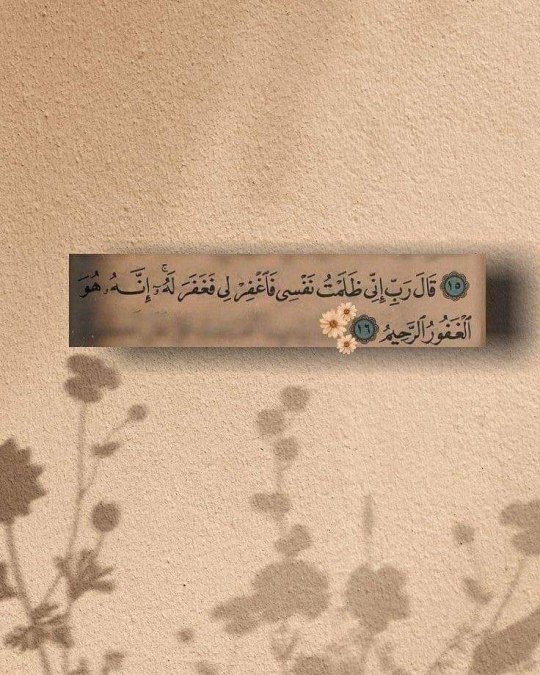
"قَالَ رَبِّ إِنِّي ظَلَمْتُ نَفْسِي فَاغْفِرْ لِي فَغَفَرَ لَهُ إِنَّهُ هُوَ الْغَفُورُ الرَّحِيمُ"
.
Quran. Surah 28 Al-Qasas, verse 16.
.
.
https://t.me/Qurantion/707
#لا اله الا الله#محمد رسول الله#اسلام#قرآن#سنة#Ислам#Коран#Сунна#Islam#Quran#Sunnah#سورة_القصص#سورة القصص#Surah 28 Al-Qasas#сура Аль-Касас#شهر رمضان#رمضان#رمضان ١٤٤٤#رمضان ٢٠٢٣#رمضان 1444#رمضان 2023#Ramadhan#Ramadan#Ramadan 1444#Ramadan 2023#Рамадан#месяц Рамадан#Рамадан 1444#Рамадан 2023#صدقة جارية
7 notes
·
View notes
Text
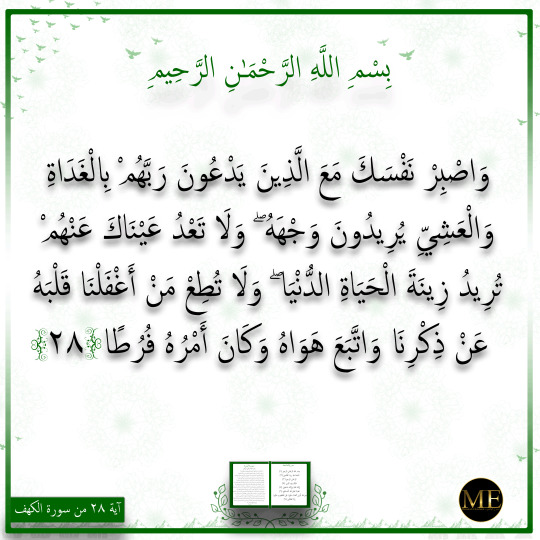
وَاصْبِرْ نَفْسَكَ مَعَ الَّذِينَ يَدْعُونَ رَبَّهُمْ بِالْغَدَاةِ وَالْعَشِيِّ يُرِيدُونَ وَجْهَهُ ۖ وَلَا تَعْدُ عَيْنَاكَ عَنْهُمْ تُرِيدُ زِينَةَ الْحَيَاةِ الدُّنْيَا ۖ وَلَا تُطِعْ مَنْ أَغْفَلْنَا قَلْبَهُ عَنْ ذِكْرِنَا وَاتَّبَعَ هَوَاهُ وَكَانَ أَمْرُهُ فُرُطًا
- آية 28 من سورة الكهف
#قرآن
#Quran
#الكهف
#kahf
3 notes
·
View notes
Text
أَلَا بِذِكْرِ ٱللَّهِ تَطْمَئِنُّ ٱلْقُلُوبُ
Verily, in the remembrance of Allah do hearts find rest.
1 note
·
View note
Text
The gheerah of Allah
Allah is not pleased with that the one who knew him, and tasted the sweetness of being close to him, and the peacefulness of being connected to him leaves to the love of someone else, or neglects him, so when his servant does such act, he makes his life depressed, and covers him with a dress of weakness and humiliation and helplessness to punish him, or perhaps bring him back.
And from his gheerah, he made immoralities forbidden in public and private, and made the punishment of those who commit them severe in dunyah and akhirah, for he can see his servants at all times, and he hates to see them in sin.
And from His gheerah is that when the first man, Adam عليه السلام , desired to live in Jannah forever instead of obeying his lord, he made him and his offspring exit it until the judgement day.
And from his gheerah, when he noticed that Ismail عليه السلام took a part of the heart of his father ibraheem عليه السلام which Allah used to fill before Ismail was born, he ordered him to kill him, as a test and reminder to Ibraheem عليه السلام.
Beware from Allah, for when he sees that the heart of his servant is filled with the love of someone else, he seals it, and makes returning to his worship hard, and loving him all again almost impossible, and one cannot then blame anyone but himself for choosing someone over his lord.
So when you see your heart darken, and your life worsen, ask yourself, who's the first one you think about when you wake up, and who's the last one you think of before your soul returns to it's creator every night, then you'll know the cause, and returning to your lord will be then the solution.
Woe to those who sold the connection to paradise for a fake temporary enjoyment in Dunyah which leads to an everlasting punishment!
-Qamar -inspired by Ibn Al Qayyim's commentary on the ayah 28 of surah Aal Imraan.
"And Allah warns you about Himself."
309 notes
·
View notes
Text
Hmm:

Regarding tenzu tablets:
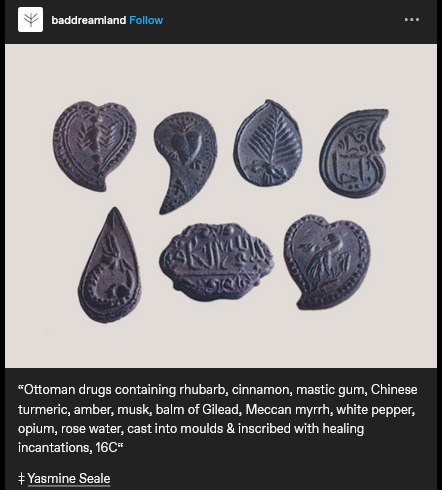
Caption reads: "Ottoman drugs containing rhubarb, cinnamon, mastic gum, Chinese tumeric, amber, musk, balm of Gilead, Meccan myrrh, white pepper, opium, rose water, cast into moulds & inscribed with healing incantations, 16C". Credited with a link to Yasmine Seale, on social media.
Original linked source doesn't mention where these particular tablets/molds were created, kept, displayed, etc. But I wanted to learn more and found a kinda recent summary of tenzu which was published by Nil Sarı (head of History of Medicine and Ethics Department at Istanbul University's Cerrahpasha medical school, president of Health History and Museology Association), which was presented at a conference in 2016:
Nil Sarı. "The Special Pharmaceutical Tablet “Tenzu” in Ottoman Medicine.” 7th International Congress for History of Islamic Medicine, October 24-28, Fez, Morocco, 2016: 24-28.
An excerpt of the text:
In Ottoman Turkish tenzu (tensuh) means "very rare beautiful thing" or "a box containing a variety of fragrances." Tenzu was also said to be the name of a place in Hitay (Eastern Turkistan / Xinjiang) where a medicinal clay - the main ingredient of the tablet tenzu - was imported from. Tenzu was a kind of theriac said to be effective against various ailments. Different tenzu prescriptions are noted in the texts [...] of several medical manuscripts of the 17th and 18th centuries. These tenzu prescriptions were described by various physicians, e.g. the head physicians Salih bin Nasrullah and Nuh Efendi as well as Hayatizade Mustafa Feyzi and Shaban Shifai who were palace physicians of the period. The special pharmaceutical tablet/pastille named "tenzu kursu" was formed in various shapes, i.e. oval, round, or rectangular. A measured amount of the drug preparation was compressed and shaped in a special brass mold named "tenzu kalibi" in Turkish. [...]
Prayers and ornamentations are engraved on the metal molds [...]. The expressions Deva al kulub (Drug for the heart) and Shifa al marghoob (The desired, yearned healing) inscribed on molds reinforce spirituality. [...] Inscriptions around the center of the other flower shaped pattern are Ferd, Hayy, Kayyum and feehi shifaun lin-naas (wherein is healing for mankind, Surah an-Nahl, verse 69). [...] Al-Hayy and Al-Qayyum are often used together. Al-Hayy signifies "ever-lasting life", and Al-Qayyum "self-existing life". [...] Sihhat bad (Have a good health) and Afiyet bad (Have a good appetite) are inscribed. [...] A. Suheyl Unver and Hayri Sozen published several tenzu prescriptions in their book "Turk Farmakaloji Tarihi I.", in 1960. [...] Tenzu prescriptions are found in several medical manuscripts kept in the Topkapi Palace Library, Suleymaniye Library and Istanbul University Rare Books Library.
Clay is a main ingredient [...]. Tiyn-i Tenzu is an unknown red colored clay. However, Terra Sigillata (Tiyn-i mahtum / muhurlu toprak) and Armenian Clay (Kil ermeni) are found in the prescriptions. [...] There are also animal products in the compositions, i.e. ambergris (amber), bezoar (badzehr), kermes (kirmiz), musk (misk), raw silk (harir-i ham / ham ipek), [...] and burnt deer antler (yanmisgeyik boynuzu). There are a wide variety of herbal drugs in the compositions, i.e. Acorus calamus [...], Aloe vera (Sabir), [...] Anchusa offinalis (Lisan-i sevr cicegi), Artemisia absinthium [...], Bambusa arundinaceae [...], Chenopodium album [...], Cinnamon (Darcin), Citrus aurantium [...], Crocus sativus (Za'feran), Embellia ribes [...], Gummi mastix [...], Heliotropium arborsecens [...], Nardustachys jatamansi [...], Potentilla reptans [...], Pterocarpus santalinus [...], Red rose/Rosa gallica [...], Rheum officinale (Ravend), Rumez acetosellaseed [...], Ruta graveolens (Keci Sadefi/Sedef Otu), Terminalia citrina [...], Terminalia chebula [...], Tormentilla (Tormentila).
Shaping and storage of these drugs are explained alongside some of the tenzu prescriptions. According to a recipe, all ingredients are beaten very thin on a porphyry (onyx marble) [...]. Each dose wrapped in gold foil is anointed an amount of almond oil. It is pressed into the mold, dried in the shade and stored in wood boxes. [...] Drugs in tablet form was an old tradition. In general, the preparation is poured onto a tray. [...] After dried in the shade, orange leaves are put between them. Stored in colored glass containers, they're reused when needed, squashed with water and drunk as a syrup. Also, flat pills made of a drachma weight were retained on the tongue in the mouth [...]. Although drugs in tablet form were used throughout Ottoman history either as a pastille or to be converted into syrup, the tenzu tablet molds were designed for the Ottoman sultans and members of the dynasty to make special tablets decorated with calligraphy [...].
[End of excerpt.]
All of these images are cropped screenshots of the PDF scan of the printed "conference works"; the PDF was uploaded online by Nil Sarı.


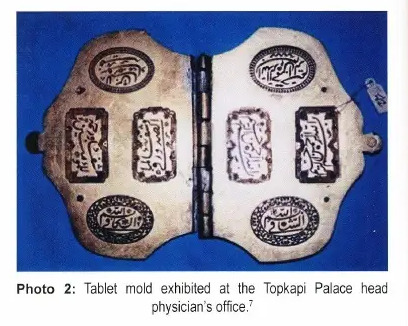

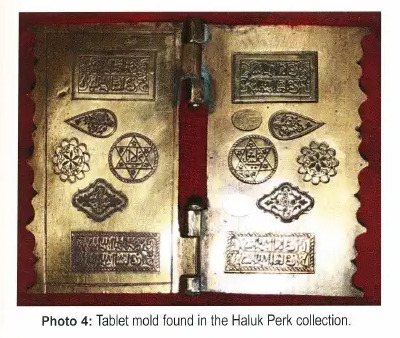
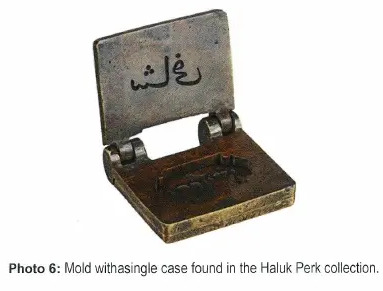
#sorry some of the non english is messed up because i had to transcribe the text myself from the image scans#also like that the Special Sweets Kitchen of the palace produced medicine
132 notes
·
View notes
Text
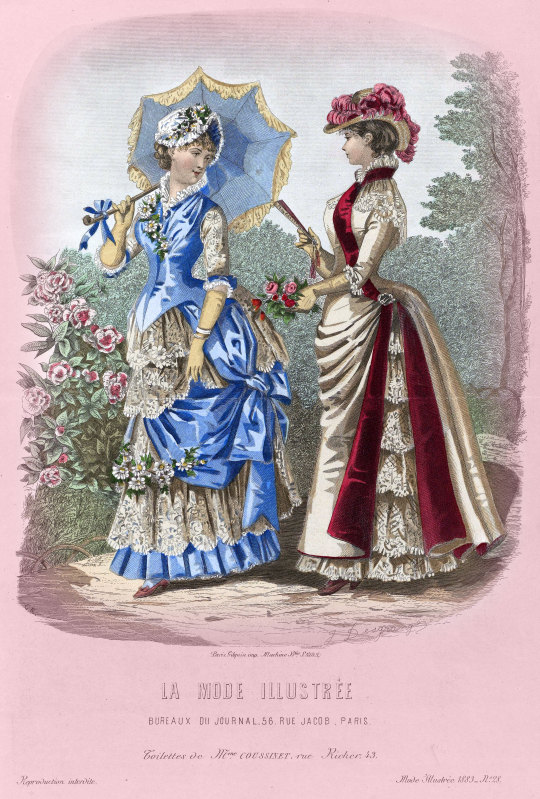
La Mode illustrée, no. 28, 15 juillet 1883, Paris. Toilettes de Mme Coussinet, rue Richer, 43. Collection of the Rijksmuseum, Netherlands
Description de toilettes (Bibliothèque Forney):
Robe en surah bleu Sèvres. Le bord inférieur de la jupe est garni de deux rangées de coques en même étoffe, surmontées de trois volants de dentelle blanche. Sous le deuxième volant se trouvent deux draperies en même surah, qui garnissent les côtés et se rattachent à une large écharpe de même étoffe, terminée par un très grand nœud, qui soulève le volant de dentelle pour former un pouf. Corsage montant en même surah, froncé sur l'épaule, ouvert en cœur. Manches demi-longues faites en dentelle, retenues à la saignée par un ruban bleu noué ; le devant de la jupe est orné d'une guirlande de chrysanthèmes; demi-guirlande pareille sur l'épaule gauche.
Jupe ronde en soie crème, couverte de volants de dentelle crème. Redingote eu serge crème doublée de soie rubis. Le corsage est croisé avec revers de soie rubis. La redingote, drapée devant, retombe derrière en quatre gros plis-tuyaux. Col droit rubis. Petite pèlerine en dentelle crème. La redingote, fendue à droite, est retenue sur la hanche par une boucle d'argent ciselé.
—
Sèvres blue surah dress. The lower edge of the skirt is trimmed with two rows of shells in the same fabric, surmounted by three flounces of white lace. Under the second ruffle are two draperies of the same surah, which trim the sides and are attached to a wide sash of the same fabric, ending in a very large bow, which lifts the lace ruffle to form a pouf. Bodice rising in the same surah, gathered on the shoulder, open in heart. Half-long sleeves made of lace, held at the kerf by a tied blue ribbon; the front of the skirt is decorated with a garland of chrysanthemums; similar half-garland on the left shoulder.
Round skirt in cream silk, covered with flounces of cream lace. Frock coat in cream serge lined with ruby silk. The bodice is crossed with ruby silk lapels. The frock coat, draped in front, falls behind in four large pipe pleats. Ruby straight collar. Small pelerine in cream lace. The frock coat, split on the right, is held on the hip by an engraved silver buckle.
#La Mode illustrée#19th century#1880s#1883#on this day#July 15#periodical#fashion#fashion plate#color#description#rijksmuseum#Forney#dress#bustle#velvet#coat#Modèles de chez#Madame Coussinet
138 notes
·
View notes
Text
And Allah wants to lighten for you [your difficulties]; and mankind was created weak.
Surah An Nisa Ayat 27-28
#quranverse#quranverses#quran ayah#quran#muslim#allahﷻ#allahuakbar#believeinallah#allahplans#allah#islam#muhammadﷺ#dhikr#duaa#repentance#islamdaily#islamicreminders#islamicquotes#islamic#islam4 life#islamicpost#islampost#deenemaan
20 notes
·
View notes
Text

{ ٱلَّذِینَ ءَامَنُوا۟ وَتَطۡمَىِٕنُّ قُلُوبُهُم بِذِكۡرِ ٱللَّهِۗ أَلَا بِذِكۡرِ ٱللَّهِ تَطۡمَىِٕنُّ ٱلۡقُلُوبُ }
[Surah Ar-Raʿd: 28]
14 notes
·
View notes
Text
🌷Duaas for seeking forgiveness🌷
There are many, MANY, most beautiful Duaas from the Qur’aan and authentic Sunnah about seeking forgiveness from Allaah Subhaanahu wa Ta’aala
Here are only a few.
📌FROM THE QUR’AAN:
🔺1. Duaa of Adam Alaiyhis-Salaatu was-Salaam to Allaah
رَبَّنَا ظَلَمْنَا أَنفُسَنَا وَإِن لَّمْ تَغْفِرْ لَنَا وَتَرْحَمْنَا لَنَكُونَنَّ مِنَ الْخَاسِرِينَ
“ Our Lord, we have wronged ourselves, and if You do not forgive us and have mercy upon us, we will surely be among the losers.” (Surah al Aaraaf:23)
🔺2. The duaa of the righteous
رَبَّنَا اغْفِرْ لَنَا ذُنُوبَنَا وَإِسْرَافَنَا فِي أَمْرِنَا وَثَبِّتْ أَقْدَامَنَا وَانصُرْنَا عَلَى الْقَوْمِ الْكَافِرِينَ
"Our Lord! Forgive us our sins and our transgressions (in keeping our duties to You), establish our feet firmly, and give us victory over the disbelieving people." (Surah Aal-Imraan:147)
🔺3. Duaa of Ibraheem Alaiyhis-Salaatu was-Salaam
رَبَّنَا اغْفِرْ لِي وَلِوَالِدَيَّ وَلِلْمُؤْمِنِينَ يَوْمَ يَقُومُ الْحِسَابُ
"Our Lord! Forgive me and my parents, and (all) the believers on the Day when the reckoning will be established." (Surah Ibraheem:41)
🔺4. Duaa of Nuh Alaiyhis-Salaatu was-Salaam
رَّبِّ ٱغۡفِرۡ لِي وَلِوَٰلِدَيَّ وَلِمَن دَخَلَ بَيۡتِيَ مُؤۡمِنٗا وَلِلۡمُؤۡمِنِينَ وَٱلۡمُؤۡمِنَٰتِۖ
“My Lord! Forgive me, and my parents, and him who enters my home as a believer, and all the believing men and women.” (Surah Nuh: 28)
🍃The Prophet sal Allaahu Alayhi wa sallam said:
‘Whoever sought forgiveness for believing men and believing women, Allaah writes a good deed for him for every believing man and woman.”
(at-Tabrani- hasan by al-Albaani, Saheeh al-Jami’ no. 6026)
🔺5. Duaa of Yunus Alaiyhis-Salaatu was-Salaam
لَّا إِلَهَ إِلَّا أَنتَ سُبْحَانَكَ إِنِّي كُنتُ مِنَ الظَّالِمِينَ
“There is no God but You; Glory be to You, Truly I have been one of the wrongdoers”
(Surah al-Anbiyah: 87)
📌FROM THE SUNNAH
🔺1. The BEST duaa for seeking forgiveness
The Prophet sal Allaahu Alayhi wa sallam called this duaa “syedul Istighfaar” or “The Master (the best) of prayers for forgiveness”
اللَّهُمَّ أَنْتَ رَبِّي، لاَ إِلَٰهَ إِلاَّ أَنْتَ، خَلَقْتَنِي وَأَنَا عَبْدُكَ، وَأَنَا عَلَى عَهْدِكَ وَوَعْدِكَ مَا اسْتَطَعْتُ، أَعُوذُ بِكَ مِنْ شَرِّ مَا صَنَعْتُ، أَبُوءُ لَكَ بِنِعْمَتِكَ عَلَىَّ وَأَبُوءُ لَكَ بِذَنْبِي، فَاغْفِرْ لِي، فَإِنَّهُ لاَ يَغْفِرُ الذُّنُوبَ إِلاَّ أَنْتَ
“O Allaah! You are my Rabb. There is no true god except You. You have created me, and I am Your slave, and I hold to Your Covenant as far as I can. I seek refuge in You from the evil of what I have done. I acknowledge thefavors that You have bestowed upon me, and I confess to you my sins. Pardon me, for none but You has the power to pardon.”
He said:
“Whoever says this during the day, believing in it firmly, and dies on that day before evening comes, he will be one of the people of Paradise, and whoever says it at night, believing firmly in it, and dies before morning comes, he will be one of the people of Paradise.”
(al-Bukhaari)
🔺2. The Duaa that the Prophet sal Allaahu Alayhi wa sallam taught Aaishah radhi Allaahu anhaa
اللَّهُمَّ إِنَّكَ عَفُوٌّ كَرِيمٌ تُحِبُّ الْعَفْوَ فَاعْفُ عَنِّي
“O Allaah, indeed You are Pardoning, [Generous,] You love pardon, so pardon me.” (al-Tirmidhī)
🔺3. The Duaa the Prophet sal Allaahu Alayhi wa sallam taught Abu Bakr radhi Allaahu anhu
اللَّهُمَّ إِنِّي ظَلَمْتُ نَفْسِي ظُلْمًا كَثِيرًا، وَلاَ يَغْفِرُ الذُّنُوبَ إِلاَّ أَنْتَ، فَاغْفِرْ لِي مِنْ عِنْدِكَ مَغْفِرَةً، إِنَّكَ أَنْتَ الْغَفُورُ الرَّحِيمُ
“O Allaah! I have wronged my soul very much (oppressed myself), and none forgives the sins but You; so please bestow Your Forgiveness upon me. No doubt, You are the Oft-Forgiving, Most Merciful.” (al-Bukhaari)
🔺4. The duaa that we say multiple times a day in between the two sujood
اللَّهُمَّ اغْفِرْ لِي، وَارْحَمْنِي، وَاهْدِنِي، وَاجْبُرْنِي، وَعَافِنِي، وَارْزُقْنِي، وَارْفَعْنِي
“O Allaah forgive me, have mercy on me, guide me, support me, protect me, provide for me and elevate me.”
(Ibn Majah, at-Tirmidhi)
🔺5. The duaa that the Prophet sal Allaahu Alayhi wa sallam said in one sitting 100 times.
رَبِّ اغْفِرْلِیْ وَ تُبْ عَلَیَّ اِنَّکَ اَنْتَ التَّوَّابُ الرَّحِیْمُ۔
“O Allaah, forgive me and accept my repentance, for You are the Accepter of Repentance, Most Merciful).”
(Abu Dawood and others- saheeh by al-Albaani)
🔺6. The duaa that the Prophet sal Allahu alayhi wa sallam used to recite in his prayer before saying the tasleem:
اللَّهُمَّ اغْفِرْ لِي مَا قَدَّمْتُ وَ مَا أَخَّرْتُ وَ مَا أَسْرَرْتُ وَ مَا أَعْلَنْتُ وَ مَا
أَسْرَفْتُ وَمَا أَنْتَ أَعْلَمُ بِهِ مِنِّي. أَنْتَ المُقَدِّمُ وَ أَنْتَ المُؤَخِّرُ لَا إِلَهَ إِلَا أَنْتَ
“O Allah! Forgive me what I have done in the past, and what I will do in the future, and what I have concealed, and what I have done openly, and what I have exceeded in, and whatever You are More Knowing of than I. You are the One who Brings Forward, and You are the One who Delays, there is no (true) diety except You.” (Ahmad, Saheeh)
And there are MANY more.
And Allaah knows best
43 notes
·
View notes
Text
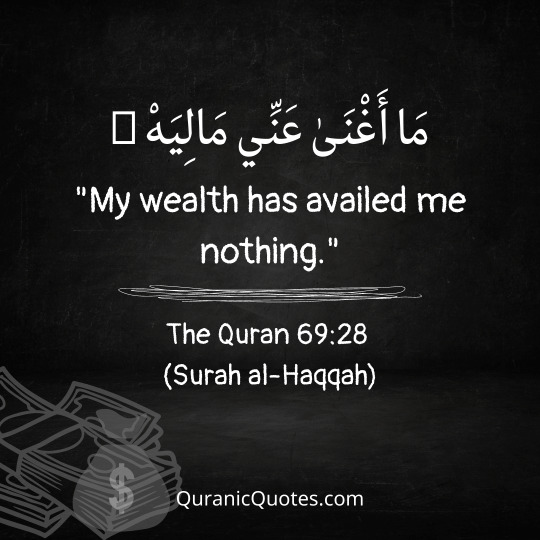
The #Quran 69:28 (Surah al-Haqqah)
مَا أَغْنَىٰ عَنِّي مَالِيَهْ ۜ
My wealth has not availed me.
#quran#quotes#quranic quotes#muslim#allah#faith#life#history#reminders#reminder#quote#beautiful#ayat#dailyquotes#30 days 30 ayahs#be better
14 notes
·
View notes
Text
And as he made his way towards Midian, he said, “I trust my Lord will guide me to the right way.”
When he arrived at the well of Midian, he found a group of people watering ˹their herds˺. Apart from them, he noticed two women holding back ˹their herd˺. He asked ˹them˺, “What is the problem?” They replied, “We cannot water ˹our animals˺ until the ˹other˺ shepherds are done, for our father is a very old man.”
So he watered ˹their herd˺ for them, then withdrew to the shade and prayed, “My Lord! I am truly in ˹desperate˺ need of whatever provision You may have in store for me.”
Then one of the two women came to him, walking bashfully. She said, “My father is inviting you so he may reward you for watering ˹our animals˺ for us.” When Moses came to him and told him his whole story, the old man said, “Have no fear! You are ˹now˺ safe from the wrongdoing people.”
-Surah Al-Qasas | 28:22-25.
38 notes
·
View notes
Text
A beautiful thing I noticed in surah Al-Qasas is that every time Musa عليه السلام found himself in a state of need/fear/worry, he calls out to his Lord only:
قَالَ رَبِّ إِنِّى ظَلَمْتُ نَفْسِى فَٱغْفِرْ لِى فَغَفَرَ لَهُۥٓ ۚ إِنَّهُۥ هُوَ ٱلْغَفُورُ ٱلرَّحِيمُ
He pleaded, “My Lord! I have definitely wronged my soul, so forgive me.” So He forgave him, ˹for˺ He is indeed the All-Forgiving, Most Merciful.
(Quran 28:16)
فَخَرَجَ مِنْهَا خَآئِفًۭا يَتَرَقَّبُ ۖ قَالَ رَبِّ نَجِّنِى مِنَ ٱلْقَوْمِ ٱلظَّـٰلِمِينَ
So Moses left the city in a state of fear and caution, praying, “My Lord! Deliver me from the wrongdoing people.”
(Quran 28:21)
وَلَمَّا تَوَجَّهَ تِلْقَآءَ مَدْيَنَ قَالَ عَسَىٰ رَبِّىٓ أَن يَهْدِيَنِى سَوَآءَ ٱلسَّبِيلِ
And as he made his way towards Midian, he said, “I trust my Lord will guide me to the right way.”
(Quran 28:22)
فَقَالَ رَبِّ إِنِّى لِمَآ أَنزَلْتَ إِلَىَّ مِنْ خَيْرٍۢ فَقِيرٌۭ
“…and prayed, “My Lord! I am truly in ˹desperate˺ need of whatever provision You may have in store for me.”
(Quran 28:24)
And the final ayah of surah Al-Qasas reinforces this strong sense of faith/tawakkul in Allah subhanahu wa ta’ala. In calling out to Him, رَبِّ ٱلْعَٰلَمِينَ only.
وَلَا تَدْعُ مَعَ ٱللَّهِ إِلَـٰهًا ءَاخَرَ ۘ لَآ إِلَـٰهَ إِلَّا هُوَ ۚ كُلُّ شَىْءٍ هَالِكٌ إِلَّا وَجْهَهُۥ ۚ لَهُ ٱلْحُكْمُ وَإِلَيْهِ تُرْجَعُونَ
“And do not invoke any other god with Allah. There is no god ˹worthy of worship˺ except Him. Everything is bound to perish except He Himself. All authority belongs to Him. And to Him you will ˹all˺ be returned.”
(Quran 28:88)
27 notes
·
View notes
Text
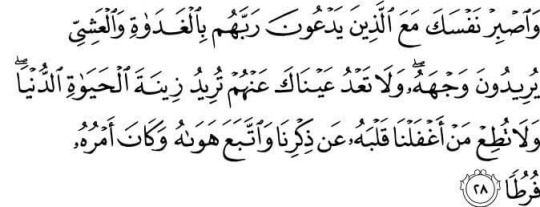
And keep yourself patient [by being] with those who call upon their Lord in the morning and the evening, seeking His countenance. And let not your eyes pass beyond them, desiring adornments of the worldly life, and do not obey one whose heart We have made heedless of Our remembrance and who follows his desire and whose affair is ever [in] neglect.
[Surah Al-Kahf 18:28] 📌
92 notes
·
View notes
Text
Don’t Marry a Person Thinking You Can Change Them.
إِنَّكَ لَا تَهْدِي مَنْ أَحْبَبْتَ وَلَٰكِنَّ اللَّهَ يَهْدِي مَن يَشَاءُ وَهُوَ أَعْلَمُ بِالْمُهْتَدِينَ
Verily, you do not guide whom you love, but Allah guides whom He wills. He is most knowing of the rightly guided.
[Surah Al-Qasas 28:56]
128 notes
·
View notes